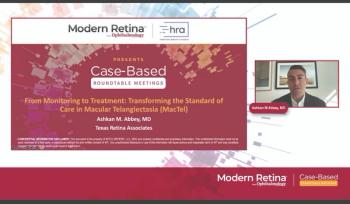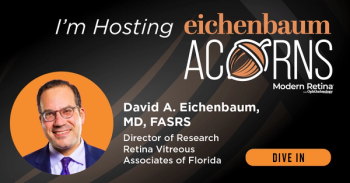
Retina Society 2023: Phase 3 studies of dual inhibition of VEGF C/D and VEGF A using OPT-302 in combination with ranibizumab or aflibercept in neovascular AMD
Nathan Steinle, MD, spoke with Modern Retina's editor to give insights into his Retina Society presentation titled, "Phase 3 studies of dual inhibition of VEGF C/D and VEGF A using OPT-302 in combination With ranibizumab (ShORe Trial) or aflibercept (COAST Trial) in neovascular AMD."
At the 56th annual Retina Society congress in New York, Nathan Steinle, MD, gave a presentation titled, "Phase 3 studies of dual inhibition of VEGF C/D and VEGF A using OPT-302 in combination With ranibizumab (ShORe Trial) or aflibercept (COAST Trial) in neovascular AMD."
He spoke the editor of Modern Retina, Sydney M. Crago, to shares some key insights from his presentation.
Video Transcript
Editor's note - This transcript has been edited for clarity.
Sydney M. Crago: I'm joined today by Dr Nathan Steinle, who is presenting at the Retina Society Congress in New York City. He's discussing the Phase 3 studies of dual inhibition of VEGF C/D and VEGF A using sozinibercept, Opthea's OPT-302 in combination with ranibizumab in the ShORe Trial or aflibercept in the COAST Trial to treat neovascular AMD. Dr Steinle, can you tell us a little bit about your presentation?
Nathan Steinle, MD: Well, thank you so much for the opportunity to share some information with the audience. So I'm here in New York, talking about two different trials, the ShORE trial and the COAST trial, and these are sponsored by a company called Opthea, and they have a molecule OPT-302, which has now been named, it's sozinibercept. Think about cozy, but zozy, so sozinibercept, and it is a antiC and D VEGF inhibitor. We're used to all these pan anti-VEGF A inhibitors, which we know work well for AMD, DME, RVO, but we're looking for even better treatments, more extended durability, that are visual acuity gains. And in fact, these trials, the ShORE trial and the COAST trial, the very few trials that are actually looking for superior vision gain. And I'll tell you a bit about the trial design and why we're excited about the future of this, this trial platform.
So with this OPT-302, or sozinibercept, it blocks anti-VEGF C and D which we know is kind of escape pathway, or up regulated pathway when you use your typical anti-VEGF A inhibitors. And in fact, they designed that into the trials that they wanted the anti-VEGF agent to be pretty agnostic. So if you look at the ShORE trial, they're looking at ranibizumab, and then the COAST trial, we're looking at aflibercept. So you can kind of, if you're a ranibizumab fan, or if you're aflibercept fan, hopefully you can use this OPT-302, or sozinibercept in combination with this in the near future.
And we're looking at specifically in the trial. It's a, it's a 2 year trial. It's a 1 year primary endpoint looking at best corrected visual acuity, and they're actually looking for superior vision gains. There's a couple different arms in ShORE and a couple of different arms in COAST, but to keep it simple, there is monotherapy arms with either Ranibizumab or aflibercept in combination with this OPT-302, or sozinibercept, in a couple of different dosing strategies. So we're looking at combination therapy. And we were looking at the primary endpoint of the best-corrected visual accuity at 1 year, and they follow those patients out to week 100 for the safety data in the second year.
As far as the overall enrollment, there's 990 patients and ShORE and 990 patients in COAST, and they're about 80% enrolled, which is exciting. And, we're looking for a closure of enrollment at the first quarter of 2024, and that will be the primary endpoint at the 1 year, and then they'll follow forward with the 2 year safety data thereafter. So, look forward for more from OPT-302 or sozinibercept in the near future. Thank you for the opportunity to share some data.
Newsletter
Keep your retina practice on the forefront—subscribe for expert analysis and emerging trends in retinal disease management.












































